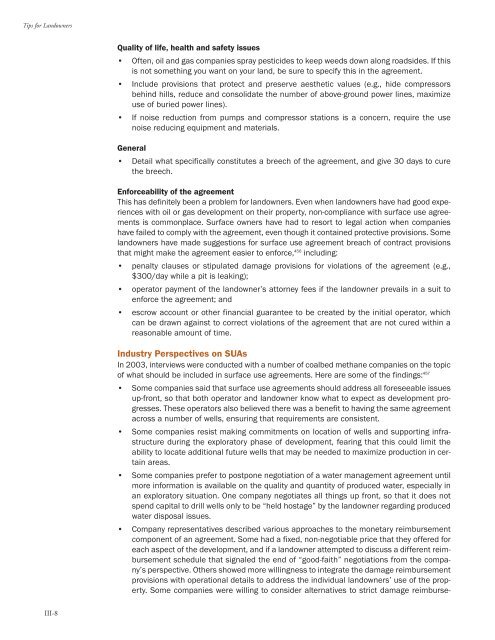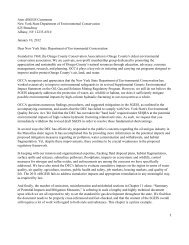Oil and Gas at Your Door? (2005 Edition) - Earthworks
Oil and Gas at Your Door? (2005 Edition) - Earthworks
Oil and Gas at Your Door? (2005 Edition) - Earthworks
Create successful ePaper yourself
Turn your PDF publications into a flip-book with our unique Google optimized e-Paper software.
Tips for L<strong>and</strong>owners<br />
Quality of life, health <strong>and</strong> safety issues<br />
• Often, oil <strong>and</strong> gas companies spray pesticides to keep weeds down along roadsides. If this<br />
is not something you want on your l<strong>and</strong>, be sure to specify this in the agreement.<br />
• Include provisions th<strong>at</strong> protect <strong>and</strong> preserve aesthetic values (e.g., hide compressors<br />
behind hills, reduce <strong>and</strong> consolid<strong>at</strong>e the number of above-ground power lines, maximize<br />
use of buried power lines).<br />
• If noise reduction from pumps <strong>and</strong> compressor st<strong>at</strong>ions is a concern, require the use<br />
noise reducing equipment <strong>and</strong> m<strong>at</strong>erials.<br />
General<br />
• Detail wh<strong>at</strong> specifically constitutes a breech of the agreement, <strong>and</strong> give 30 days to cure<br />
the breech.<br />
Enforceability of the agreement<br />
This has definitely been a problem for l<strong>and</strong>owners. Even when l<strong>and</strong>owners have had good experiences<br />
with oil or gas development on their property, non-compliance with surface use agreements<br />
is commonplace. Surface owners have had to resort to legal action when companies<br />
have failed to comply with the agreement, even though it contained protective provisions. Some<br />
l<strong>and</strong>owners have made suggestions for surface use agreement breach of contract provisions<br />
th<strong>at</strong> might make the agreement easier to enforce, 456 including:<br />
• penalty clauses or stipul<strong>at</strong>ed damage provisions for viol<strong>at</strong>ions of the agreement (e.g.,<br />
$300/day while a pit is leaking);<br />
• oper<strong>at</strong>or payment of the l<strong>and</strong>owner’s <strong>at</strong>torney fees if the l<strong>and</strong>owner prevails in a suit to<br />
enforce the agreement; <strong>and</strong><br />
• escrow account or other financial guarantee to be cre<strong>at</strong>ed by the initial oper<strong>at</strong>or, which<br />
can be drawn against to correct viol<strong>at</strong>ions of the agreement th<strong>at</strong> are not cured within a<br />
reasonable amount of time.<br />
Industry Perspectives on SUAs<br />
In 2003, interviews were conducted with a number of coalbed methane companies on the topic<br />
of wh<strong>at</strong> should be included in surface use agreements. Here are some of the findings: 457<br />
• Some companies said th<strong>at</strong> surface use agreements should address all foreseeable issues<br />
up-front, so th<strong>at</strong> both oper<strong>at</strong>or <strong>and</strong> l<strong>and</strong>owner know wh<strong>at</strong> to expect as development progresses.<br />
These oper<strong>at</strong>ors also believed there was a benefit to having the same agreement<br />
across a number of wells, ensuring th<strong>at</strong> requirements are consistent.<br />
• Some companies resist making commitments on loc<strong>at</strong>ion of wells <strong>and</strong> supporting infrastructure<br />
during the explor<strong>at</strong>ory phase of development, fearing th<strong>at</strong> this could limit the<br />
ability to loc<strong>at</strong>e additional future wells th<strong>at</strong> may be needed to maximize production in certain<br />
areas.<br />
• Some companies prefer to postpone negoti<strong>at</strong>ion of a w<strong>at</strong>er management agreement until<br />
more inform<strong>at</strong>ion is available on the quality <strong>and</strong> quantity of produced w<strong>at</strong>er, especially in<br />
an explor<strong>at</strong>ory situ<strong>at</strong>ion. One company negoti<strong>at</strong>es all things up front, so th<strong>at</strong> it does not<br />
spend capital to drill wells only to be “held hostage” by the l<strong>and</strong>owner regarding produced<br />
w<strong>at</strong>er disposal issues.<br />
• Company represent<strong>at</strong>ives described various approaches to the monetary reimbursement<br />
component of an agreement. Some had a fixed, non-negotiable price th<strong>at</strong> they offered for<br />
each aspect of the development, <strong>and</strong> if a l<strong>and</strong>owner <strong>at</strong>tempted to discuss a different reimbursement<br />
schedule th<strong>at</strong> signaled the end of “good-faith” negoti<strong>at</strong>ions from the company’s<br />
perspective. Others showed more willingness to integr<strong>at</strong>e the damage reimbursement<br />
provisions with oper<strong>at</strong>ional details to address the individual l<strong>and</strong>owners’ use of the property.<br />
Some companies were willing to consider altern<strong>at</strong>ives to strict damage reimburse-<br />
III-8




